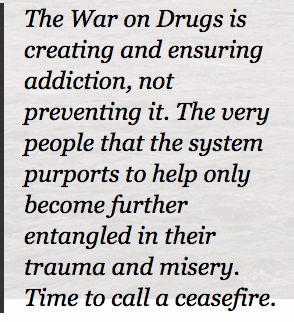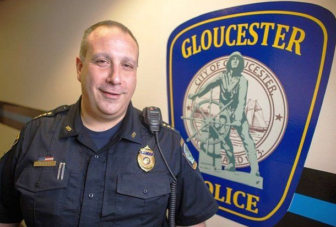“Would our society object if ‘cutters’ were sent to prison? If emotionally damaged women, who kept going back to a physically abusive husband, were sent to prison?” – Amanda Bouldin

When I found blues and jazz in my moody early 20s, my spirit was lifted. I suppose it was therapeutic for me to hear someone else complain. I commiserated with Ray Charles and Louis Armstrong, feeling less alone. Unhappiness is a universal experience, transcending culture and time.

One of my favorites is Billie Holiday. I looked her up on Wikipedia a few years ago and found out that Billie was a heroin addict, alcoholic, and prostitute. Talk about having the blues! Born in Philly in 1915 to an unwed teenage mother, Billie was raped when she was 10 years old and again at 14. With a fifth-grade education, no marketable skills, and a history of having been abused, it’s no surprise that Billie turned to drugs and began prostituting herself; her pimp poetically became her manager in the music industry. It was during her lifetime that heroin was first banned in the United States, and she died handcuffed to a hospital bed because she was regarded as a criminal. The authorities forced the doctors to cut off her methadone, resulting in her death at only 44 years old.

An oft-cited scientific study on addiction is that a rat, left alone in a cage with free and unlimited access to a water feeder laced with an addictive drug, will consume the drug obsessively until he dies of overdose. The conclusion? Drugs will make you kill yourself, and this is why Billie needed to be handcuffed to her hospital bed as she lay dying. In the 1970s, a scientist named Bruce Alexander attempted to reproduce the rat experiment, with a few changes. Instead of one rat, alone in a cage, he created “Rat Park” – full of friends, toys, activities, and a variety of food. These rats were given free access to both heroin-laced water and untainted water. By and large, the rats ignored the drug water. Alexander acquired new rats, gave them an IV of heroin for 57 straight days, and then dropped them into Rat Park, full of fun and friends. The rats voluntarily went through withdrawals, altogether rejecting the drug-laced water in favor of a healthier option. Alexander says that when one lives a fulfilling and purposeful life, with a sufficient amount of love and connection with others, drugs are not desired.
In researching for my state legislation about addiction, I learned of Canadian physician and author Gabor Mate, who specializes in addiction treatment. After decades counseling drug addicts, Mate realized that the vast majority of his patients had been victims of physical or sexual abuse prior to using drugs. He also points out that the majority of people who try any drug – caffeine, nicotine, or otherwise – do not become addicted. Only about 10 percent of people who try drugs become addicts. Mate’s conclusion was that trauma, not the chemical, causes drug addiction. Drug use is simply a coping mechanism. Just as someone might engage in “cutting,” gambling, or promiscuous sex, the activity serves as a way to manufacture some semblance of control over a chaotic and miserable life. The activity allows for happiness that is not easily gained otherwise. In his talks, Mate also discusses how addictive behavior carries on through generations. He says that parents hand down their pain and their coping mechanisms to their children.

My mother grew up dirt poor, neglected by her mother and tossed from one babysitter to another. My mom grew up too fast, learning certain survival skills in the process. At 30 years old, I am realizing how much like my mother I am. I watch myself employ the same coping mechanisms (AKA “solutions to problems”) that she used. This is what she taught me, even if she didn’t realize it. I should count my lucky stars that her coping mechanism didn’t involve substance abuse. She’s just a workaholic. Everyone has their coping mechanism. Now I drown myself in tasks and productivity; leisure time gets old quick. Do I work so much because it helps to distract me from my thoughts? Am I afraid to face the person that I really am, in a quiet room with nothing to do? What am I running from? My mother loves history and she’s told me many stories that have stuck with me over the years. Once, she told me that Native Americans have a genetic predisposition for alcoholism. It’s only in my research over the last six months that I discovered that the spike in alcohol use among Native Americans coincides with the transit to the reservations, a time period during which these people were surely quite miserable. Today, alcoholism rates are much higher among Native Americans than among other peoples. Perhaps that generation unwittingly passed this coping mechanism to the next generation, and on it went. Is it genetic?
I think it’s just a question of nature vs. nurture. An old friend once told me that his parents are alcoholics, and his siblings are alcoholics, and he’s an alcoholic too; that it’s just a family thing. Could it be that his parents simply taught him their coping mechanism s? Could it be that he knows of no other way to deal with a broken heart, or disappointment, or lack of purpose in life, other than to drink?
s? Could it be that he knows of no other way to deal with a broken heart, or disappointment, or lack of purpose in life, other than to drink?
Trauma can come in so many forms. Before doing this research, I believed that “trauma” meant something utterly awful, like losing a limb, or terrorism, or witnessing a murder. The deeper I dug, I realized that trauma can be something as simple as parents’ divorce. If divorce is traumatic to the child, and almost everyone is doing it these days, then almost everyone has suffered some serious trauma. Maybe we just overlook it because it is happening to everyone. It begins to seem normal, but that doesn’t make it hurt any less. We’re all traumatized in some way or another, and we’re all coping. Some people cope by abusing drugs.
Eventually, drug users get arrested and taken to prison, where they are traumatized further. Make no bones about it – in prison, people are tased, maced, raped, and beaten. They’re cut off from communication with loved ones and their roommates tend toward violence. They’re locked in solitary confinement for days or weeks on end. It’s a world in which might makes right; prison is not a place where people coexist peacefully. It is not a place for spiritual healing or personal growth.
Society is finally coming around to the idea that force doesn’t solve most problems – in fact, giving someone the freedom to choose, plus a little empathy, is an ideology that our society is moving toward. My grandmother’s generation opposed breastfeeding and believed that it was best to let a child “cry it out” alone in the crib, believing that meeting a child’s needs created a needy child. My generation is realizing the harms of this method and 20-something mothers are sleeping next to their children nightly, nursing until three years of age, holding their babies at every waking moment, and responding quickly to every whimper. Why? Studies have shown that when infants have unmet needs at the beginning of life, they grow up having extensive trust and intimacy issues, often becoming quite needy. Studies also show that when infants are “babied,” they grow up happy, confident, and independent. In time, we all realize the folly of our ancestors. Humans are social animals, genetically programmed to need each other, to need love and connection. The imprisonment of drug addicts instead digs the hole deeper.
When I was a kid, I was taught the Golden Rule: treat others as I’d like to be treated. I was encouraged to be loving to others, take their feelings into consideration when I made decisions, and treat others with kindness. This is hard to live every day. When I look at a drug addict, when I know that this person is acting from a place of trauma and pain, when I know that my neighbor yearns for a better life but doesn’t know how to attain it, the last thing I’d ever want to do is to cause her more trauma. I would want my neighbor to be given the love and patience that I have needed from others as I have grown over the years. I would be nowhere without the support of my friends while I struggle through this thing called life, trying to shake off yesterday’s demons in the fight for a better self.
Blues and jazz music, for me, is like a hug from a friend. If I’m sad, you can’t really fix it – but knowing that I’m not alone plays a big role in my healing. People who abuse drugs are utterly alone in the world – that’s why they turn to drugs. They might have a family and many friends, but they’re incapable of actually verbalizing their pain or reaching out for support. For people like this, locking them up will only make their addictions worse. They need a hug from a friend… and so much more.

Police officers all over New Hampshire have been quoted in recent news articles saying, “We’re not going to arrest our way out of this.” The Gloucester, Mass., police department announced just a few weeks ago that they will no longer be arresting people who come into the station seeking addiction treatment. A Senator in Nevada introduced legislation this year modeled on the Swiss and Portuguese drug treatment systems – drug addicts are not arrested, and the funding put into prosecution and imprisonment is instead directed toward treatment programs.
Despite this, the New Hampshire House of Representatives recently passed SB 106, a bill that expands the War on Drugs by making even more chemicals illegal and, in turn, imprisoning yet more traumatized people. To my shock, 98 percent of Democrats present supported the legislation. The measure passed. The true insanity in this bill is evident in what it bans – synthetic drugs like “spice.” Synthetic drugs are desirable solely because more harmless drugs like marijuana are illegal in this state (flashback to “moonshine” during alcohol prohibition). This ban motivates basement chemists to create something that is chemically “technically legal” but untested and likely dangerous; with SB 106, the state voluntarily entered into a game of cat-and-mouse with basement chemists. If spice is so dangerous, the obvious solution is to legalize marijuana – not to put more traumatized, coping people in jail. With every day that passes, addiction will only grow in our state. The War on Drugs is 100 years old, but it expands daily and has become a global epidemic. Billie Holiday, a child prostitute, an impoverished black woman in racially heated times, would have been 100 years old today had she received treatment instead of abuse. Perhaps it is time to consider that the “solution” is only worsening the problem.

State Rep. Amanda Bouldin, D-Manchester, was elected in 2014. She is a sponsor of HB 271 and represents Manchester’s Ward 5.
Letters to the Editor may be submitted to robidouxnews@gmail.com, subject line “Letters.”
You ’re one click away! Sign up for our free eNewsletter and never miss another thing
’re one click away! Sign up for our free eNewsletter and never miss another thing







